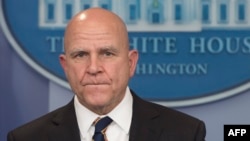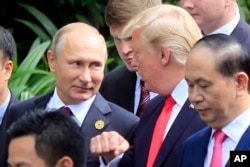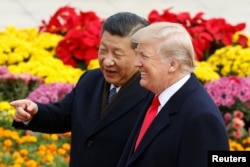The United States will unveil a new national security strategy Dec. 18 aimed at preserving the world order forged in the aftermath of World War II, despite efforts by powers like Russia and China to tear it down.
White House National Security Adviser Gen. H.R. McMaster said the new strategy would rely on "peace through strength" to advance U.S. interests abroad. And he promised that alliances with traditional U.S. allies would play a prominent role in Washington's approach.
"We have to work together harder than ever to ensure that nations uphold the rule of law, respect the sovereignty of their neighbors and support the post-World War II, post-Cold War order of peace, stability and collective security," McMaster said Tuesday, speaking alongside his British counterpart during a speech in Washington.
Despite concerns that President Donald Trump's "America First" campaign might lead to a retreat from the world stage, McMaster said the new strategy would do the opposite, and instead mark the return of a more confident, more determined United States.
"In many ways, we vacated a lot of competitive space in recent years and created opportunities for these revisionist powers," he said, referring to Moscow and Beijing. "You'll see a big emphasis on competitive engagement — competitive engagement across what we're calling arenas of competition."
Trump administration officials have been working on the much-anticipated national security strategy for months. McMaster said the finished document is centered on four main principles: protecting the U.S. homeland; advancing American prosperity and economic security; a stronger, more capable military; and advancing U.S. influence.
The strategy also highlights several different threats: those from powers like Russia and China, as well as from so-called rogue regimes, such as Iran and North Korea.
Russia and China
McMaster specifically called out Russia for threatening the U.S. with "so-called new generation warfare," an apparent reference to the U.S. intelligence community assessment that Moscow tried to influence the 2016 presidential election.
"These are very sophisticated campaigns of subversion and disinformation and propaganda using sovereign tools, operating across global domains that attempt to divide our communities within our nations and pit them against each other," McMaster said.
The U.S. national security adviser also criticized China for what he termed "economic aggression."
"[China] is challenging the rules-based economic order that helped lift hundreds of thousands of people out of poverty," McMaster said.
At the same time, McMaster called on Beijing to do more to corral North Korea, calling China's economic power over Pyongyang "considerable," while warning this might be the world's "last, best chance to avoid military conflict."
"The president is not asking [Chinese] President Xi for a favor," McMaster warned. "It is in both our interests to resolve this problem."
Iran
On Iran, McMaster promised the new U.S. strategy would seek to counter Tehran's destabilizing activities in Syria and across the Middle East, while continuing to block all paths to a nuclear weapon.
The new U.S. national security strategy will also address the persistent threat from terror groups and what McMaster called "radical Islamist ideology," describing previous U.S. approaches to the problem as "too myopic."
Speaking before McMaster on Tuesday, British National Security Adviser Mark Sedwill said the U.S. "remains the indispensable global leader."
"We have had a global order that has been underwritten by the United States," Sedwill said. "That will continue to be the case, I'm sure, in the 21st century."






